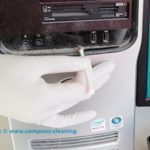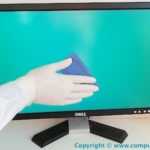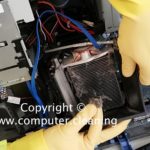➊ Cough and sneeze etiquette u Cover your nose and mouth with a tissue when you a cough or sneeze. Throw the tissue away after use and wash your hands with soap and water. If soap and water are not available, use an alcohol-based hand sanitizer. If a tissue is not available, cover your mouth and nose with your sleeve, not your hand.
Avoid touching your eyes, nose, or mouth.
The skin that lines your eyes, nose, and mouth is called your mucous membranes. Germs can make their way into the body through mucous membranes, so keeping your hands away from your face keeps germs from entering your mucous membranes and helps to keep you from getting sick.
➋ Isolation/social distancing u Stay home if you are sick. Don’t risk passing your germs on to others at your program. Go to the CDC website http://www.cdc.gov/outbreaks/index.html for the latest information when there is an infectious disease outbreak. They will provide information on how to deal with special disease outbreaks like H1N1, including how long you should stay at home before returning to work.
Encourage children and staff who are coughing or sneezing to leave a 3-6 foot buffer between themselves and others.
➌ Vaccinations Next to hand washing, vaccinations are the best way to protect against infectious disease, according to the CDC. States require certain immunizations for infectious disease before children can attend ECE. Each centre should know what immunizations are required in their state.
The publication Caring for Our Children: National Health and Safety Performance Standards recommends (and child care licensing regulations in most states require) that child care facilities maintain documentation of the immunizations the children in attendance have received. Immunizations are particularly important for children in ECE programs because they are at higher risk of complications from infectious disease due to their immature immune systems. Vaccinations are also recommended for caregivers, teachers, and other staff members. Check your state’s child care guidelines for required and recommended vaccinations.
➍ Equipment Certain pieces of equipment can aid in reducing the transmission of infectious disease by reducing the number of high touch areas where microbes may be spread or by increasing air flow from the ventilation system in an ECE facility.
No-touch bathroom facilities are available as self-flushing toilets and faucets that turn on and off automatically. Automatic flushers can be added to most existing toilets. Handsfree faucets that use a sensor to turn the water on and off are also available at most home improvement stores.
Disposal equipment such as diaper pails and garbage cans should have a tightfitting lid that can be opened with a foot pedal so that ECE staff are not touching places where microbes might live and multiply.
Separate equipment for food preparation, diaper-changing, and toddler handwashing. Keeping these activities physically separate helps reduce the risk of spreading germs from one activity to another.
Impermeable, seamless surfaces for use in food preparation, diaper-changing, and handwashing. Surfaces that are porous, cracked, or damaged increase the likelihood that germs will escape disinfection and allow transmission, especially when people touch these surfaces frequently.
➎ Ventilation Ventilation is the exchange of fresh air within a building. Increasing the amount of fresh air within a building and removing indoor air containing germs that are spread through the air can also reduce the risk of infectious disease.
Mechanical ventilation is usually known as a central heating, ventilating, and air conditioning (HVAC) system. If you have an HVAC system in your facility, make sure it is inspected and serviced on a yearly basis and that the air filters are changed regularly.
Passive ventilation is the air that comes in from opening and closing doors or windows. This source of air is also affected by the wind and conditions outside. You can increase the amount of air brought in and removed from a room by putting an exhaust fan in a window on one side of a room or building, and opening a window on the opposite side to pull in air, move it across space, and exhaust (remove) it to the outside. Make sure you are not bringing in air from an area where vehicles are idling.
➏ Air filtering and cleaning equipment This equipment can filter or kill germs and filter pollutants from cleaning and disinfectant products out of the air. Some air cleaning devices are designed to be installed in the ductwork of an HVAC system to clean the air in the whole building. You can also buy portable room air cleaners to clean the air in a single room or specific areas. There are several processes available:
Air filtering. To filter out germs such as viruses, which are very tiny, requires a filter that has a high-efficiency particulate air (HEPA) rating. These should be properly sized for the room.
Air cleaning. Some equipment will kill germs, but is not appropriate for use in a child care setting (such as ultraviolet light) or are not safe (such as devices that clean air but also create ozone, a pollutant).





